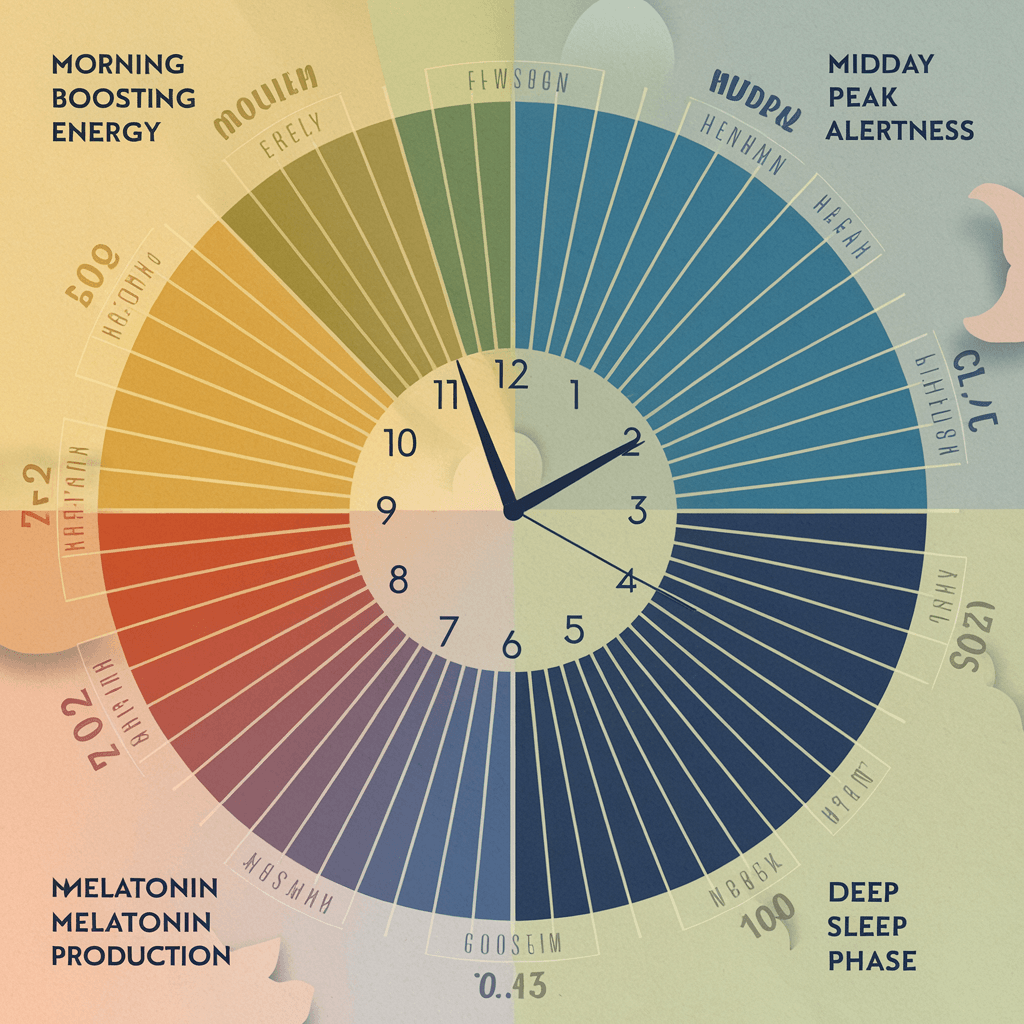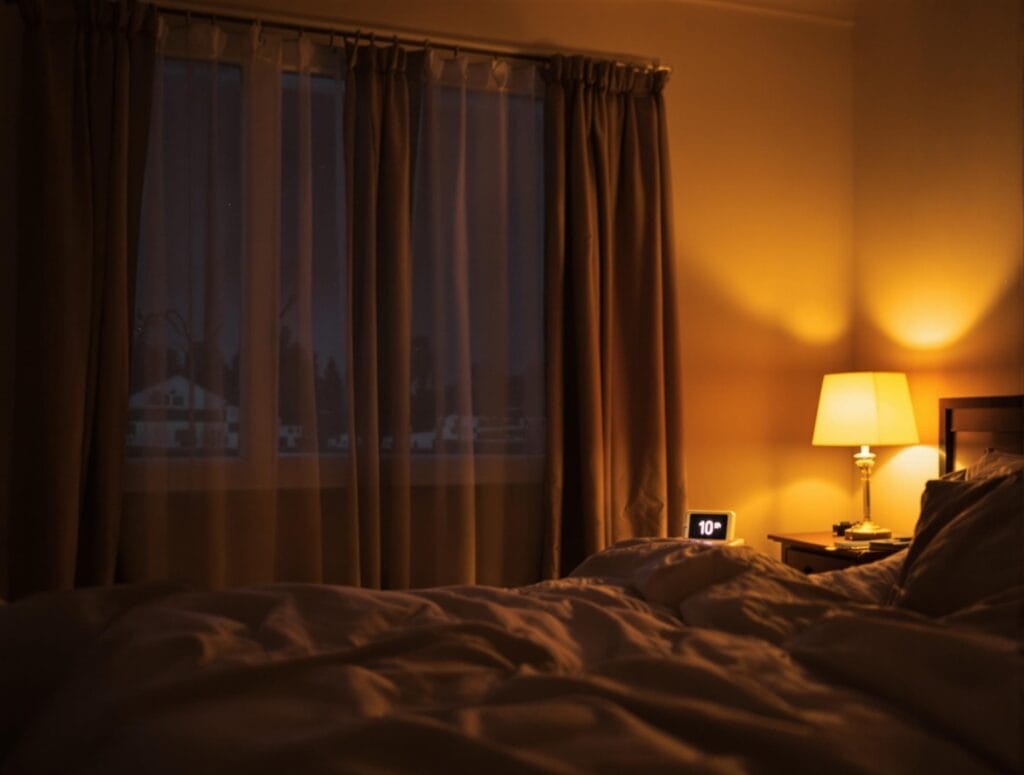Introduction: Why Circadian Rhythm Matters
Imagine waking up refreshed, feeling energized throughout the day, and naturally falling asleep at night. Sounds ideal, right? But for millions of people, this natural cycle is disrupted due to circadian rhythm sleep disorders—conditions that throw off the body’s internal clock, leading to chronic sleep issues, fatigue, and even serious health risks.
Circadian rhythm regulates sleep-wake cycles, metabolism, hormone production, and body temperature, ensuring these biological functions align with day and night. However, when disrupted, it can cause insomnia, excessive daytime sleepiness, mood swings, and cognitive impairment.
In today’s fast-paced world, night shifts, excessive screen exposure, irregular sleep schedules, and long-distance travel are some of the major contributors to circadian misalignment. Left unchecked, these disruptions can increase the risk of obesity, diabetes, heart disease, and mental health disorders.
In this guide, we’ll explore 7 common circadian rhythm sleep disorders, their causes, symptoms, and scientifically backed treatments to help restore a healthy sleep cycle.
What is Circadian Rhythm?
Circadian rhythm is the body’s internal clock that regulates biological functions over a 24-hour cycle. It’s primarily controlled by the suprachiasmatic nucleus (SCN) in the brain, which responds to light and darkness.

🔹 Morning Light Exposure: Signals the body to produce cortisol, keeping you alert.
🔹 Evening Darkness: Triggers the release of melatonin, preparing you for sleep.
Without these environmental cues, circadian rhythms can become misaligned, leading to poor sleep quality, fatigue, and metabolic imbalances.
How the Biological Clock Regulates Sleep
Your circadian rhythm works closely with sleep pressure, a mechanism controlled by adenosine buildup in the brain. Together, they dictate:
✅ When you feel sleepy or alert.
✅ The quality and duration of your sleep.
✅ Your energy levels throughout the day.
But when external factors—like shift work, jet lag, or excessive blue light exposure—disrupt this balance, it can lead to circadian rhythm sleep disorders.
7 Common Circadian Rhythm Sleep Disorders
Circadian rhythm sleep disorders occur when the body’s internal clock is out of sync with the external environment, causing difficulties in falling asleep, staying asleep, or waking up at the right time.
📊 Table 1: Circadian Rhythm Disorders & Their Symptoms
| Disorder | Main Symptom | Who It Affects Most |
|---|---|---|
| Delayed Sleep Phase Disorder (DSPD) | Difficulty falling asleep before 2-3 AM | Teens, young adults, night owls |
| Advanced Sleep Phase Disorder (ASPD) | Falling asleep very early (6-8 PM) & waking up early | Older adults |
| Irregular Sleep-Wake Rhythm Disorder | No fixed sleep schedule, multiple short naps | Dementia patients, neurodisorders |
| Non-24-Hour Sleep-Wake Disorder | Sleep timing shifts forward every day | Blind individuals, rare sighted cases |
| Shift Work Sleep Disorder (SWSD) | Insomnia & daytime fatigue due to shift work | Night shift & rotating shift workers |
| Jet Lag Disorder | Sleep disruption after traveling across time zones | Frequent travelers, airline staff |
| Social Jet Lag | Weekday-weekend sleep inconsistency | Students, professionals, socializers |
Each of these disorders affects individuals differently, depending on genetics, lifestyle, and external factors like work schedules or travel.
1. Delayed Sleep Phase Disorder (DSPD)
What It Is:
Delayed Sleep Phase Disorder (DSPD) is a condition where a person’s natural sleep-wake cycle is significantly delayed, making it difficult to fall asleep at a conventional bedtime. Those with DSPD often don’t feel sleepy until 2 AM or later and struggle to wake up in the morning.
Who It Affects:
🔹 Teens and young adults are most commonly affected.
🔹 Night owls who prefer staying up late naturally.
Causes:
✅ Genetics – DSPD often runs in families.
✅ Excessive screen time at night – Blue light suppresses melatonin production.
✅ Irregular sleep schedules – Staying up late on weekends worsens the condition.
Symptoms:
❌ Difficulty falling asleep before 2-3 AM
❌ Extreme difficulty waking up in the morning
❌ Daytime fatigue and excessive sleepiness
❌ Poor school or work performance due to lack of sleep
Treatments:
✔️ Light Therapy: Exposing yourself to bright light in the morning can help reset your clock.
✔️ Melatonin Supplements: Taking melatonin 1-2 hours before desired bedtime can help advance sleep time.
✔️ Consistent Sleep Schedule: Going to bed and waking up at the same time daily—even on weekends.
2. Advanced Sleep Phase Disorder (ASPD)
What It Is:
Advanced Sleep Phase Disorder (ASPD) is the opposite of DSPD. People with ASPD fall asleep very early (e.g., 6-8 PM) and wake up extremely early (e.g., 3-5 AM), often struggling to stay awake in the evening.
Who It Affects:
🔹 Older adults – More common in individuals over 60.
🔹 People with a genetic predisposition to early sleep timing.
Causes:
✅ Aging: The body’s natural circadian rhythm shortens with age.
✅ Genetics: A hereditary component has been found in some cases.
✅ Neurological changes: Changes in brain function may contribute to early sleep shifts.
Symptoms:
❌ Feeling excessively sleepy in the early evening
❌ Waking up too early and unable to go back to sleep
❌ Struggling to stay awake during social events or work meetings
❌ Feeling well-rested but out of sync with the normal daily schedule
Treatments:
✔️ Evening Light Therapy: Exposure to bright light in the evening can delay melatonin release.
✔️ Melatonin Delayed Timing: Taking melatonin later in the evening can help push bedtime forward.
✔️ Gradual Schedule Adjustment: Shifting sleep time in 15-minute increments over a few weeks.
3. Irregular Sleep-Wake Rhythm Disorder (ISWRD)
What It Is:
Irregular Sleep-Wake Rhythm Disorder (ISWRD) is a condition where a person’s sleep pattern lacks consistency, leading to multiple naps or sleep episodes throughout a 24-hour period instead of a single consolidated sleep phase.
Who It Affects:
🔹 Older adults with neurodegenerative diseases (e.g., Alzheimer’s, dementia)
🔹 People with brain injuries or neurological disorders
🔹 Individuals with no fixed daily routine
Causes:
✅ Disrupted circadian signals: The brain fails to regulate a single sleep-wake cycle.
✅ Neurodegeneration: Loss of function in the suprachiasmatic nucleus (SCN).
✅ Lack of external time cues: No exposure to regular light/dark cycles or structured activities.
Symptoms:
❌ No defined bedtime—sleep occurs in fragmented periods throughout the day.
❌ Daytime sleepiness followed by nighttime wakefulness.
❌ Poor sleep quality leading to memory and cognitive issues.
❌ Increased risk of falls, confusion, and behavioral problems in elderly individuals.
Treatments:
✔️ Consistent Sleep Routine: Establishing structured wake-up and bedtime hours.
✔️ Exposure to Natural Light: Spending more time outdoors or using bright light therapy during the day.
✔️ Melatonin & Sleep Aids: Controlled use of melatonin to regulate sleep patterns.
4. Non-24-Hour Sleep-Wake Disorder (Non-24)
What It Is:
Non-24-Hour Sleep-Wake Disorder (Non-24) occurs when a person’s circadian rhythm is longer than 24 hours, causing their sleep-wake cycle to gradually shift forward each day. This results in constantly changing sleep patterns over time.
Who It Affects:
🔹 Blind individuals (most common group affected)
🔹 People with extreme circadian rhythm sensitivity
🔹 Rare cases in sighted individuals with no clear cause
Causes:
✅ Lack of light perception (in blind individuals): The brain cannot reset the internal clock through light exposure.
✅ Genetic mutations affecting circadian regulation.
✅ Unknown causes in sighted individuals.
Symptoms:
❌ Sleep timing shifts progressively forward, making bedtime unpredictable.
❌ Alternating periods of insomnia and excessive sleepiness.
❌ Difficulty maintaining a regular work or social schedule.
❌ Chronic sleep deprivation due to inconsistent sleep cycles.
Treatments:
✔️ Melatonin Therapy: Taking melatonin at specific times to stabilize the sleep cycle.
✔️ Timed Light Therapy (for sighted individuals): Exposing the body to bright morning light to reset the circadian clock.
✔️ Strict Sleep Hygiene: Maintaining a consistent sleep-wake schedule despite shifting internal cues.
5. Shift Work Sleep Disorder (SWSD)
What It Is:
Shift Work Sleep Disorder (SWSD) affects individuals who work non-traditional hours, such as night shifts, rotating shifts, or early morning shifts. Their circadian rhythm struggles to adjust, leading to sleep deprivation and excessive daytime sleepiness.

Who It Affects:
🔹 Night shift workers (hospital staff, security personnel, emergency responders)
🔹 Rotating shift workers (factory workers, airline crews, call center employees)
🔹 Early morning shift workers (bakers, garbage collectors, transportation workers)
Causes:
✅ Circadian rhythm misalignment—Body expects sleep at night, but work disrupts it.
✅ Artificial light exposure at night—Suppresses melatonin and keeps the brain alert.
✅ Inconsistent sleep schedule—Frequent shift changes prevent the body from adapting.
Symptoms:
❌ Insomnia during the day despite extreme fatigue.
❌ Excessive sleepiness at night, leading to reduced focus and productivity.
❌ Increased risk of workplace accidents due to cognitive impairment.
❌ Higher risk of obesity, diabetes, heart disease, and depression.
Treatments:
✔️ Blackout Curtains & Eye Masks: Block out sunlight during daytime sleep.
✔️ Strategic Naps: Short power naps before work can improve alertness.
✔️ Light Therapy: Exposure to bright light during shifts and limiting blue light exposure post-shift.
✔️ Consistent Sleep Routine: Maintain regular sleep/wake times, even on off-days.
6. Jet Lag Disorder
What It Is:
Jet Lag Disorder occurs when traveling across multiple time zones disrupts the body’s internal clock, leading to fatigue, insomnia, and daytime drowsiness. The body needs time to adjust to the new time zone, which varies by distance traveled and direction (eastward or westward travel).

Who It Affects:
🔹 Frequent travelers (business professionals, pilots, flight attendants)
🔹 Tourists crossing multiple time zones
🔹 Athletes competing internationally
Causes:
✅ Rapid time zone changes—Body’s clock remains in the original time zone.
✅ Eastward travel (harder to adjust)—Losing time shortens the day, making adjustment difficult.
✅ Lack of exposure to sunlight—Delays circadian adaptation to the new time zone.
Symptoms:
❌ Insomnia or difficulty staying asleep in the new time zone.
❌ Daytime fatigue and brain fog, impacting concentration.
❌ Digestive issues, such as bloating or loss of appetite.
❌ Mood changes, including irritability and mild depression.
Treatments:
✔️ Gradual Sleep Adjustments: Shift sleep/wake times by 1 hour per day before travel.
✔️ Melatonin Supplements: Taking melatonin in the evening can help reset the body clock.
✔️ Sunlight Exposure: Spending time outdoors in daylight speeds up circadian adjustment.
✔️ Hydration & Nutrition: Staying hydrated and avoiding caffeine/alcohol supports faster recovery.
7. Social Jet Lag
What It Is:
Social Jet Lag occurs when a person’s weekend or social schedule disrupts their normal sleep routine, leading to a misalignment between biological time and social obligations. Unlike regular jet lag caused by travel, this is self-imposed due to lifestyle choices.
Who It Affects:
🔹 Students who stay up late on weekends and struggle on Monday mornings.
🔹 Professionals with irregular work and social schedules.
🔹 Individuals who shift between late-night socializing and early work obligations.
Causes:
✅ Inconsistent sleep patterns between weekdays and weekends.
✅ Late-night social activities, binge-watching, or excessive screen exposure.
✅ Sleeping in too late on weekends, delaying the circadian rhythm.
Symptoms:
❌ Extreme sleepiness on Monday mornings (“Weekend Jet Lag”).
❌ Difficulty falling asleep early after staying up late.
❌ Poor focus, mood swings, and increased caffeine dependence.
❌ Higher risk of obesity, heart disease, and depression over time.
Treatments:
✔️ Consistent Sleep Routine: Keep bedtime and wake-up times within a 1-hour range daily.
✔️ Limit Weekend Sleep Delays: If staying up late, avoid sleeping in excessively.
✔️ Morning Light Exposure: Get bright sunlight early in the day to reset your rhythm.
✔️ Caffeine Management: Avoid coffee after 2 PM to prevent night-time alertness.
How Circadian Rhythm Disorders Affect Health
Circadian rhythm misalignment is not just a sleep issue—it has widespread effects on mental, physical, and cognitive health.
Mental Health Effects
- 🔹 Increased risk of anxiety and depression due to chronic sleep deprivation.
- 🔹 Higher stress levels caused by irregular cortisol production.
- 🔹 Greater likelihood of mood swings and irritability.
Physical Health Risks
- ⚠️ Obesity & Diabetes: Disrupted sleep affects hormones regulating hunger (ghrelin & leptin), leading to overeating and weight gain.
- ⚠️ Cardiovascular Disease: Poor sleep raises blood pressure, heart rate, and inflammation, increasing stroke and heart disease risk.
- ⚠️ Weakened Immune System: Sleep deprivation reduces immune function, making individuals more susceptible to infections.
Cognitive Impacts
- 🧠 Memory Impairment: Sleep is critical for memory consolidation and brain detoxification.
- 🧠 Reduced Focus & Productivity: Poor sleep leads to brain fog, slower reaction times, and impaired decision-making.
- 🧠 Higher Risk of Dementia: Long-term circadian disruption is linked to neurodegenerative diseases like Alzheimer’s.
Best Treatments & Lifestyle Adjustments
Circadian rhythm disorders can be managed effectively with scientific strategies that help reset the body’s internal clock. Below are the best treatment options.
📊 Table 2: Best Treatments for Different Circadian Rhythm Disorders
| Disorder | Best Treatment Methods | Additional Tips |
|---|---|---|
| DSPD (Night Owl Disorder) | Morning light therapy, melatonin at night | Maintain strict bedtime routine |
| ASPD (Early Bird Disorder) | Evening light exposure, melatonin delay therapy | Avoid bright light in the morning |
| ISWRD (No Fixed Sleep Pattern) | Fixed wake-up time, bright light during the day | Avoid naps longer than 30 minutes |
| Non-24-Hour Disorder | Melatonin therapy, timed light exposure | Maintain a rigid schedule |
| Shift Work Disorder | Blackout curtains, scheduled naps, caffeine use | Use bright light at work, avoid late caffeine |
| Jet Lag | Gradual time shift, melatonin, hydration | Avoid alcohol & caffeine during flights |
| Social Jet Lag | Weekend sleep consistency, morning sunlight | Limit weekend sleep-ins to under 1 hour |
1. Light Therapy: How & When to Use It
What It Is:
Light therapy involves exposing yourself to bright artificial light or natural sunlight at specific times to regulate your circadian rhythm.
🔹 Morning Light Therapy: Helps shift sleep earlier (useful for DSPD & shift work disorder).
🔹 Evening Light Exposure: Helps delay sleep (useful for ASPD & jet lag).
✅ Best Practice: Use a 10,000-lux light box for 20–30 minutes immediately after waking.
2. Melatonin Supplements: Dosage & Timing
What It Is:
Melatonin is a natural sleep hormone that signals the body when it’s time to rest. Supplements can help reset a misaligned body clock.
✅ Best Time to Take Melatonin:
- DSPD: Take 0.5–3 mg, 1–2 hours before bedtime.
- ASPD: Take melatonin later in the evening to delay sleep.
- Jet Lag: Take melatonin at bedtime in the new time zone.
⚠️ Caution: Long-term, high-dose use may suppress natural melatonin production.

3. The Power of Proper Sleep Hygiene
Maintaining good sleep habits is one of the simplest ways to regulate the circadian rhythm.
✅ Follow a Consistent Sleep Schedule:
- Go to bed at the same time daily, even on weekends.
- Wake up at the same time every morning.
✅ Optimize Your Sleep Environment:
- Use blackout curtains and remove blue light sources before bed.
- Keep your bedroom cool (65°F or 18°C) for optimal sleep.
✅ Reduce Evening Stimulation:
- Avoid screens (phones, laptops, TVs) at least 1 hour before bed.
- Limit caffeine after 2 PM and avoid alcohol close to bedtime.
4. Diet & Exercise: Their Role in Circadian Regulation
What You Eat & When You Exercise Affects Your Body Clock!
✅ Diet for Circadian Health:
- Eat protein & healthy fats in the morning to boost energy.
- Avoid large meals within 2 hours of bedtime.
- Stay hydrated but limit liquids before bed to avoid night awakenings.
✅ Exercise & Circadian Rhythm:
- Morning exercise can help advance the sleep phase (for DSPD).
- Evening exercise can help delay sleep onset (for ASPD).
- Avoid high-intensity workouts before bed, as they can delay sleep.
Frequently Asked Questions (FAQ)
1. What are the signs of circadian rhythm sleep disorders?
The most common signs include:
✅ Difficulty falling asleep or waking up at desired times.
✅ Chronic daytime fatigue or excessive sleepiness.
✅ Insomnia, brain fog, or difficulty concentrating.
✅ Disruptions in appetite and mood.
2. Can you reset your circadian clock naturally?
Yes! Circadian rhythm can be adjusted by:
✅ Exposure to bright morning light.
✅ Avoiding blue light before bed.
✅ Maintaining a fixed sleep schedule, even on weekends.
✅ Using melatonin supplements when necessary.
3. What’s the best way to treat sleep disorders without medication?
The most effective non-medication treatments are:
✔️ Light therapy (exposure to natural light in the morning).
✔️ Proper sleep hygiene (consistent bedtime, limiting screens).
✔️ Lifestyle adjustments (exercise, diet, stress management).
4. How long does it take to recover from jet lag?
⏳ On average, it takes 1 day per time zone crossed to fully adjust.
💡 Eastward travel (losing time) is harder to adjust to than westward travel.
5. Is working night shifts bad for your health?
❌ Yes, long-term night shifts can increase risks of:
- Heart disease
- Obesity & metabolic disorders
- Mood disorders like depression
✔️ Mitigation strategies include: light therapy, strategic napping, and maintaining a fixed sleep routine.
6. Do blue light filters really help with sleep?
✅ Yes! Blue light-blocking glasses or night mode settings on screens reduce melatonin suppression, making it easier to fall asleep.
💡 Best practice: Avoid screens at least 1 hour before bed.
7. How does aging affect circadian rhythms?
As people age:
✅ The sleep-wake cycle naturally shifts earlier (ASPD).
✅ Melatonin production declines, making it harder to stay asleep.
✅ Sleep becomes more fragmented, increasing night awakenings.
Conclusion: Take Control of Your Sleep Health
Circadian rhythm sleep disorders are more than just sleep inconveniences—they affect mental clarity, physical health, and overall well-being. Whether you’re dealing with jet lag, shift work challenges, or social jet lag, resetting your body’s clock is possible with light exposure, sleep hygiene, and lifestyle modifications.
By understanding how circadian rhythms work, you can take proactive steps to improve your sleep, boost energy levels, and enhance long-term health.
📌 Final Tip: Start with small changes, such as adjusting light exposure, improving bedtime routines, and maintaining a regular sleep schedule. Your body will thank you!


























